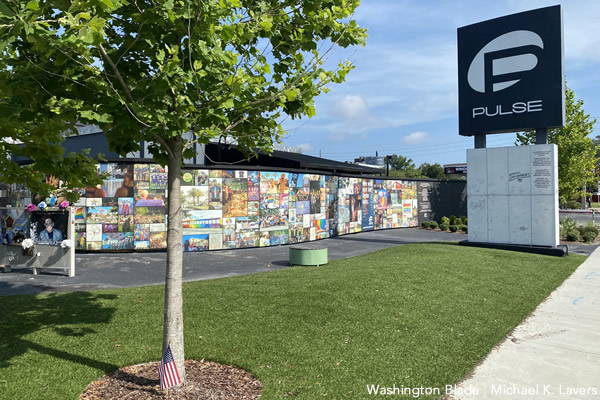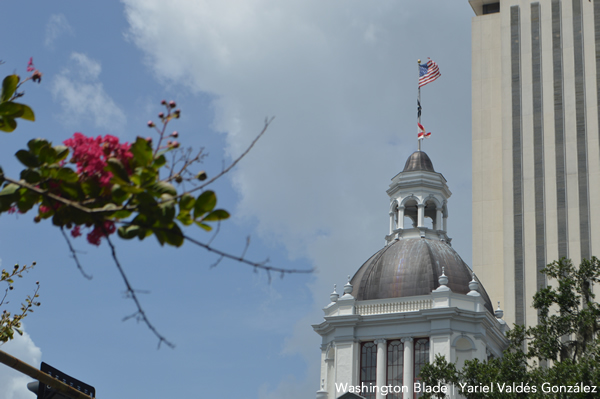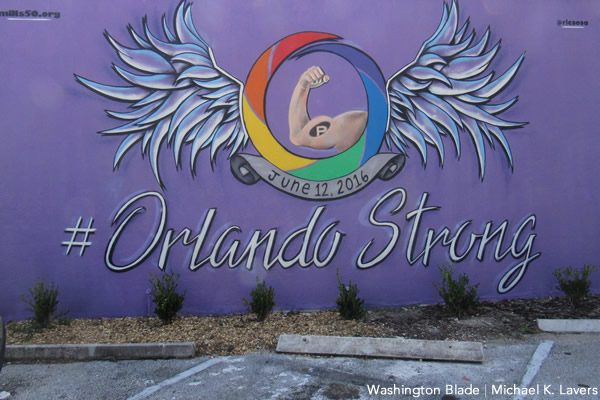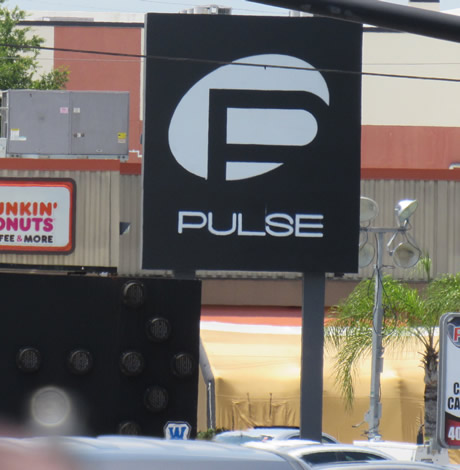National
‘We’re still very much in the healing phase’
Saturday marks five years since Pulse nightclub massacre

Saturday marks five years since a gunman killed 49 people inside the Pulse nightclub in Orlando, Fla.
A remembrance ceremony will take place at the site, which is now an interim memorial. A number of other events to honor the victims will take place in Orlando and throughout Central Florida over the coming days.
“We’re still very much in the healing phase and trying to find our way,” Pulse owner Barbara Poma told the Washington Blade on Tuesday during a telephone interview.
The massacre at the time was the deadliest mass shooting in modern U.S. history.
Nearly half of the victims were LGBTQ Puerto Ricans. The massacre also sparked renewed calls for gun control.
Poma told the Blade that she expects construction will begin on a “Survivor’s Walk” at the site by the end of the year. A museum — which she described as an “education center” that will “talk about the history of the LGBT community and its struggles and stripes for the last century or so … about why safe spaces were important to this community” and what happened at Pulse and the global response to it — will be built a third of a mile away.
“We really feel it is important to never forget what happened at Pulse and to tell the story of that,” said Poma.
Poma noted the onePULSE Foundation of which she is the executive director met with representatives of the 9/11 Tribute Museum and the Oklahoma City National Memorial and Museum to discuss the memorial. Poma when she spoke with the Blade acknowledged the plans have been criticized.
“This kind of opposition is not unique to these kind of projects,” she said.
“It’s just important to know that really what we’re trying to do is make sure what happened is never forgotten and those lives were never forgotten,” added Poma.
Poma on Tuesday declined to comment on the lawsuits that have been filed against her, her husband and the onePULSE Foundation in the wake of the massacre.
DeSantis’ anti-LGBTQ policies overshadow anniversary
The Blade this week spoke with Equality Florida CEO Nadine Smith, state Rep. Carlos Guillermo Smith (D-Orlando) and other activists and elected officials in Florida and Puerto Rico who were part of the immediate response to the massacre.
Equality Florida raised millions of dollars for survivors and victims’ families. CEO Nadine Smith on Tuesday told the Blade during a telephone interview that Equality Florida in the massacre’s immediate aftermath pledged to honor the victims “with action by uprooting hatred at its source and from that time we have invested deeply in safe and healthy schools.”
“Schools are a shared cultural experience where the attitudes of ignorance and fear and animosity and violence towards others either get challenged or encouraged,” said Smith. “Five years later I look at how far this work has come and at the same time, I’m very aware of the backlash that we are facing, particularly in our schools with laws targeting trans youth specifically.”
Republican Florida Gov. Ron DeSantis on June 1 signed a bill that bans transgender athletes from participating in high school and college sports teams that correspond with their gender identity. The governor the following day vetoed funding that activists say would have funded programs for Pulse survivors and homeless LGBTQ youth.
Carlos Guillermo Smith, a gay man who represents portions of Orlando, on Tuesday described DeSantis as “callous.”
“The governor’s actions are a reminder that five years after the attack at Pulse nightclub, we have a lot of work to do to push back against homophobia and transphobia,” said Carlos Guillermo Smith. “The Orlando community is very supporting and accepting of the LGBTQ community, but when you see what’s happening at the Governor’s Mansion in Tallahassee, you realize that there’s a lot of work to be done.”
Pedro Julio Serrano, associate director of Waves Ahead, an LGBTQ service organization in Puerto Rico, described the massacre’s impact in the U.S. commonwealth as “permanent in our collective memory.” Serrano also noted violence against trans Puerto Ricans remains rampant.
“We are now the epicenter of anti-trans violence in the U.S. and its territories,” said Serrano. “After five years, we still confront this hatred that doesn’t seem to stop. We will continue to fight until all of us are safe.”

Tony Lima, a long-time Florida-based activist who is currently CEO of Arianna’s Center, an organization that serves trans women of color in Florida, the South and Puerto Rico, helped organize vigils and blood drives in the days after the massacre.
“We knew how important it was to aid our family in Orlando in this immediate crisis,” Lima told the Blade on Monday. “Orlando and South Florida are intrinsically connected. We often share resources in nightlife, events, advocacy and a lot of the same people … so I think there was a natural synergy there.”
Lima, like Nadine Smith and Carlos Guillermo Smith, sharply criticized DeSantis for signing the anti-trans bill and for vetoing funds for Pulse survivors and homeless LGBTQ youth. Lima also lamented the lack of progress on gun control.
A gunman on Feb. 14, 2018, killed 17 people at Marjory Stoneman Douglas High School in Parkland, Fla. Lima told the Blade there have been two deadly mass shootings in South Florida in recent days.
“We have a huge problem when it comes to gun control in this country, and sadly five years later we haven’t made a whole lot of progress,” he said.

Orlando’s support of LGBTQ rights part of ‘bigger call to action’
Felipe Sousa-Lazaballet is the senior specialist for inclusion, diversity and equity for the city of Orlando’s Office of Multicultural Affairs. He is also Mayor Buddy Dyer’s LGBTQ liaison.
Orlando City Hall on June 1 raised the Pride flag in commemoration of Pride month.
Sousa-Lazaballet noted the fountain in Lake Eola Park in downtown Orlando was the colors of the trans Pride flag in commemoration of the International Transgender Day of Visibility. Orlando in 2019 became the first city in Florida to include National LGBT Chamber of Commerce-certified businesses in its municipal contracting and procurement programs.
“All of that is part of that bigger call to action, which is we want to honor the 49,” said Sousa-Lazaballet. “But we also want to with action by making the city an even more welcoming place for all.”
Sousa-Lazaballet, Carlos Guillermo Smith and Nadine Smith all told the Blade the way that Orlando, Central Florida, the country and the world responded to the massacre remains a source of pride.
“I think about how many messages there were in the aftermath that called on the worst instincts in people to be fearful of each other, to hate people as a group, to cower and to hide and I will never forget and have been changed by the Orlando community, how the nation and in fact globally people responded to the absolute opposite,” said Nadine Smith. “That is a light that I hold on to.”
Poma echoed Nadine Smith.
“We hope that our goal is to create that beacon of light that can come out of such darkness,” said Poma. “Darkness is a really dangerous place to get stuck in and so while we all wish what happened on June 12 never happened, it did and it’s now our moral and social responsibility to do something with that and that for me is creating light and change from what we all endured.”


The Comings & Goings column is about sharing the professional successes of our community. We want to recognize those landing new jobs, new clients for their business, joining boards of organizations and other achievements. Please share your successes with us at [email protected].
Congratulations to Gil Pontes III on his recent appointment to the Financial Advisory Board for the City of Wilton Manors, Fla. Upon being appointed he said, “I’m honored to join the Financial Advisory Board for the City of Wilton Manors at such an important moment for our community. In my role as Executive Director of the NextGen Chamber of Commerce, I spend much of my time focused on economic growth, fiscal sustainability, and the long-term competitiveness of emerging business leaders. I look forward to bringing that perspective to Wilton Manors — helping ensure responsible stewardship of public resources while supporting a vibrant, inclusive local economy.”
Pontes is a nonprofit executive with years of development, operations, budget, management, and strategic planning experience in 501(c)(3), 501(c)(4), and political organizations. Pontes is currently executive director of NextGen, Chamber of Commerce. NextGen Chamber’s mission is to “empower emerging business leaders by generating insights, encouraging engagement, and nurturing leadership development to shape the future economy.” Prior to that he served as managing director of The Nora Project, and director of development also at The Nora Project. He has held a number of other positions including Major Gifts Officer, Thundermist Health Center, and has worked in both real estate and banking including as Business Solutions Adviser, Ironwood Financial. For three years he was a Selectman, Town of Berkley, Mass. In that role, he managed HR and general governance for town government. There were 200+ staff and 6,500 constituents. He balanced a $20,000,000 budget annually, established an Economic Development Committee, and hired the first town administrator.
Pontes earned his bachelor’s degree in political science from the University of Massachusetts, Dartmouth.
Kansas
ACLU sues Kansas over law invalidating trans residents’ IDs
A new Kansas bill requires transgender residents to have their driver’s licenses reflect their sex assigned at birth, invalidating current licenses.

Transgender people across Kansas received letters in the mail on Wednesday demanding the immediate surrender of their driver’s licenses following passage of one of the harshest transgender bathroom bans in the nation. Now the American Civil Liberties Union is filing a lawsuit to block the ban and protect transgender residents from what advocates describe as “sweeping” and “punitive” consequences.
Independent journalist Erin Reed broke the story Wednesday after lawmakers approved House Substitute for Senate Bill 244. In her reporting, Reed included a photo of the letter sent to transgender Kansans, requiring them to obtain a driver’s license that reflects their sex assigned at birth rather than the gender with which they identify.
According to the reporting, transgender Kansans must surrender their driver’s licenses and that their current credentials — regardless of expiration date — will be considered invalid upon the law’s publication. The move effectively nullifies previously issued identification documents, creating immediate uncertainty for those impacted.
House Substitute for Senate Bill 244 also stipulates that any transgender person caught driving without a valid license could face a class B misdemeanor, punishable by up to six months in jail and a $1,000 fine. That potential penalty adds a criminal dimension to what began as an administrative action. It also compounds the legal risks for transgender Kansans, as the state already requires county jails to house inmates according to sex assigned at birth — a policy that advocates say can place transgender detainees at heightened risk.
Beyond identification issues, SB 244 not only bans transgender people from using restrooms that match their gender identity in government buildings — including libraries, courthouses, state parks, hospitals, and interstate rest stops — with the possibility for criminal penalties, but also allows for what critics have described as a “bathroom bounty hunter” provision. The measure permits anyone who encounters a transgender person in a restroom — including potentially in private businesses — to sue them for large sums of money, dramatically expanding the scope of enforcement beyond government authorities.
The lawsuit challenging SB 244 was filed today in the District Court of Douglas County on behalf of anonymous plaintiffs Daniel Doe and Matthew Moe by the American Civil Liberties Union, the ACLU of Kansas, and Ballard Spahr LLP. The complaint argues that SB 244 violates the Kansas Constitution’s protections for personal autonomy, privacy, equality under the law, due process, and freedom of speech.
Additionally, the American Civil Liberties Union filed a temporary restraining order on behalf of the anonymous plaintiffs, arguing that the order — followed by a temporary injunction — is necessary to prevent the “irreparable harm” that would result from SB 244.
State Rep. Abi Boatman, a Wichita Democrat and the only transgender member of the Kansas Legislature, told the Kansas City Star on Wednesday that “persecution is the point.”
“This legislation is a direct attack on the dignity and humanity of transgender Kansans,” said Monica Bennett, legal director of the ACLU of Kansas. “It undermines our state’s strong constitutional protections against government overreach and persecution.”
“SB 244 is a cruel and craven threat to public safety all in the name of fostering fear, division, and paranoia,” said Harper Seldin, senior staff attorney for the ACLU’s LGBTQ & HIV Rights Project. “The invalidation of state-issued IDs threatens to out transgender people against their will every time they apply for a job, rent an apartment, or interact with police. Taken as a whole, SB 244 is a transparent attempt to deny transgender people autonomy over their own identities and push them out of public life altogether.”
“SB 244 presents a state-sanctioned attack on transgender people aimed at silencing, dehumanizing, and alienating Kansans whose gender identity does not conform to the state legislature’s preferences,” said Heather St. Clair, a Ballard Spahr litigator working on the case. “Ballard Spahr is committed to standing with the ACLU and the plaintiffs in fighting on behalf of transgender Kansans for a remedy against the injustices presented by SB 244, and is dedicated to protecting the constitutional rights jeopardized by this new law.”
National
After layoffs at Advocate, parent company acquires ‘Them’ from Conde Nast
Top editorial staff let go last week

Former staff members at the Advocate and Out magazines revealed that parent company Equalpride laid off a number of employees late last week.
Those let go included Advocate editor-in-chief Alex Cooper, Pride.com editor-in-chief Rachel Shatto, brand partnerships manager Erin Manley, community editor Marie-Adélina de la Ferriére, and Out magazine staff writers Moises Mendez and Bernardo Sim, according to a report in Hollywood Reporter.
Cooper, who joined the company in 2021, posted to social media that, “Few people have had the privilege of leading this legendary LGBTQ+ news outlet, and I’m deeply honored to have been one of them. To my team: thank you for the last four years. You’ve been the best. For those also affected today, please let me know how I can support you.”
The Advocate’s PR firm when reached by the Blade said it no longer represents the company. Emails to the Advocate went unanswered.
Equalpride on Friday announced it acquired “Them,” a digital LGBTQ outlet founded in 2017 by Conde Nast.
“Equalpride exists to elevate, celebrate and protect LGBTQ+ storytelling at scale,” Equalpride CEO Mark Berryhill said according to Hollywood Reporter. “By combining the strengths of our brands with this respected digital platform, we’re creating a unified ecosystem that delivers even more impact for our audiences, advertisers, and community partners.”
It’s not clear if “Them” staff would take over editorial responsibilities for the Advocate and Out.


















